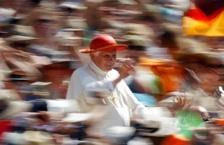By Sandro Magister
The Chiesa
August 1, 2011
http://chiesa.espresso.repubblica.it/articolo/1348936?eng=y
 |
The crisis of the Church is not resolved with the practical changes requested by its critics, but with a more lively and more real faith. Joseph Ratzinger was absolutely convinced of this as already as a cardinal. A memorable clash between him and a French archbishop helps to explain his current conduct as pope
ROME, August 1, 2011 – In the heart of this summer, the attacks against Benedict XVI have suddenly picked up steam again, from outside and inside of the Church.
From the outside, there has been the frontal attack – of unprecedented harshness – of Irish prime minister Enda Kenny, who accused the Catholic hierarchy, even at the highest levels, of protecting pedophile priests from the rigors of earthly justice. Kenny even found a guilty seat for Joseph Ratzinger, because of this statement when he was a cardinal: "Standards of conduct appropriate to civil society or the workings of a democracy cannot be purely and simply applied to the Church."
In an editorial, the "Financial Times" also sided with the Irish prime minister and against the Catholic Church. In Ireland, a law is being considered that would require priests to inform state agencies of any sexual abuse of minors learned about in the sacrament of confession.
From within the Church, meanwhile, a new onslaught of demands has emerged on the part of droves of priests in Austria, the United States, Australia, and little by little in other countries, calling for the abolition of clerical celibacy, the conferral of priestly ordination on women, communion for divorced and remarried persons.
What ties all of these attacks together is the pressure to make the Church conform to the practices of the modern democracies, and imitate the dominant cultural currents.
At closer inspection, the reform of the Church demanded by these accusers has at its center not doctrinal changes, but the modification of its organization and discipline. Orthodoxy does not matter to them, but orthopraxy does: it is the practical rules of the Church that must be changed and brought into step with the times.
It is precisely of this that Benedict XVI is accused: of insisting on the truth of doctrine, and rejecting the practical innovations that the Church needs.
*
In reality, the current pontificate is also characterized by an important series of normative changes in the areas of liturgy, finance, law, ecumenism, to the point that authoritative scholars of ecclesiastical law dedicated a recent conference precisely to "Benedict XVI, canonical legislator."
Any original material on these pages is copyright © BishopAccountability.org 2004. Reproduce freely with attribution.